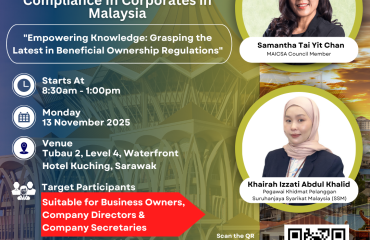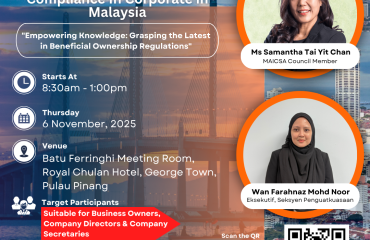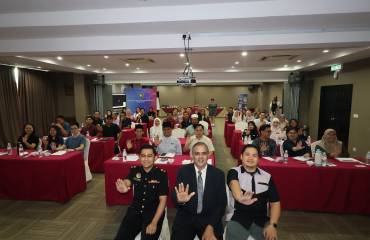PRESS STATEMENT
Thursday, 7 November 2013
2012 MACC Annual Report
Transparency International – Malaysia (TI-M) congratulates MACC Chief Commissioner, Tan Sri Abu Kassim Mohammed on the MACC’s 85 percent prosecution and conviction rate, which he claims surpasses other countries such as Hong Kong, Singapore and Indonesia. Compared to the MACC’s conviction rate of only 45 percent in 2009, the 2012 rate of 85 percent is a drastic improvement, and even went beyond the international standards of 80 percent.
The 2012 MACC Report states that out of the 5,496 corruption cases almost 75 percent were resolved, including 701 arrests and 313 people prosecuted. Of those prosecuted 33.5 percent were civil servants, 53 percent civilians, 13 percent private sector workers and 0.5 percent politicians. This includes the high-profile cases of former Sabak Bernam MP and former UiTM Dean. TI-M commends the MACC for exemplifying that high-profile cases are not exempt from prosecution. With the former MP receiving a six year jail sentence and RM400,000 ringgit fine and former Dean obtaining a one-year jail sentence, a clear message of justice and no impunity needs to be upheld. With the MACC cracking down on major operations such as diesel smuggling, the dealings of offering Bazaar lots for sale and the Iskandar project discrepancy, the extent of corruption is undoubtedly prevalent in all sectors, and prosecution and conviction rates need to continue increasing.
In principle, we should be proud; however, TI-M is of the opinion that, despite the MACC’s conviction rate of 88 percent as at June 2013, the MACC still has a lot of work to do to fight corruption. Hong Kong’s ICAC has hit 90 percent in the same period, and in order to match the performance of the ICAC, the MACC should rake in all, whether it is a high profile or ordinary cases. After all, our TI Corruption Perceptions Index (CPI) surveys take into the account of not only about comparing bribes being reported, the number of prosecutions or corruption court cases but also how effective prosecutions and the courts are and the media in investigating and exposing corruption.
The MACC should also send its officers into key government departments, not only as part of Integrity Management Unit and also as undercover operatives. Unless the MACC is able to clamp down on the perpetrators of everyday petty corruption and grand corruption to exemplify their long term effectiveness, the public will only be immune to the display of high success rates.
However, TI-M maintains the MACC should be independent and have its own prosecutorial powers. In fact, their counterpart in Indonesia has already been given the prosecutorial powers. Without giving the MACC the powers is akin to having a roaring tiger without its teeth in a jungle where corruption and abuse of power has become the rule of life in Malaysia.
There is no reason to believe that there would be elements of abuse if the MACC is given the prosecutorial powers. Abuse of power should be the Government’s last fear, as the current system also may allow the Attorney General’s Chambers (AGC) to abuse its power whenever it chooses not to proceed with the prosecution.
The prosecutorial powers should only be invoked by the MACC if there is sufficient reason to convince the advisory board that there is pressure from the top or because the case involves some cronies.
In order to have a more independent MACC that is ‘feared’ by all, Article 145 of the Federal Constitution should be amended to include the MACC as one of the two parties besides the AGC to have the discretionary power to prosecute. At the moment, the Chief Commissioner and his officers are only given the power to investigate under Section 7 of the MACC Act 2009.
END







